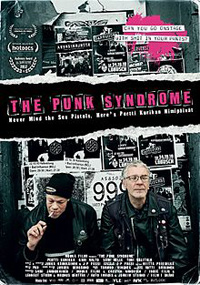Meandering From The Group Home To The Stage
 Punk rock is alive and well in Finland thanks to the seemingly miraculous rise of Pertti Kurikka’s Name Day, an old school four piece whose roots lie in a somewhat surprising place – mental illness. All four members suffer from Down Syndrome, meaning they have an extra chromosome that has caused a variety of developmental issues. It is clear that each of them struggles with their situation on a daily basis, whether it be general situational incomprehension, or emotional overreaction, but directors Jukka Kärkkäinen and Jani-Petteri Passi have captured them both as capable band members who like to have a good time, and as handicapped citizens that still need a little extra support every now and then. Unfortunately, in piecing together the band’s story, they forgot to form any sort of structured narrative that could give insight into how Pertti Kurikka’s Name Day came to be, and what might be next for them.
Punk rock is alive and well in Finland thanks to the seemingly miraculous rise of Pertti Kurikka’s Name Day, an old school four piece whose roots lie in a somewhat surprising place – mental illness. All four members suffer from Down Syndrome, meaning they have an extra chromosome that has caused a variety of developmental issues. It is clear that each of them struggles with their situation on a daily basis, whether it be general situational incomprehension, or emotional overreaction, but directors Jukka Kärkkäinen and Jani-Petteri Passi have captured them both as capable band members who like to have a good time, and as handicapped citizens that still need a little extra support every now and then. Unfortunately, in piecing together the band’s story, they forgot to form any sort of structured narrative that could give insight into how Pertti Kurikka’s Name Day came to be, and what might be next for them.
Underneath the tattered leather vests and worn black jeans is a punk rock quartet fronted by guitarist and songwriter Pertti Kurikka, a highly emotional man who seems to be getting up there in age. His straight-from-the-heart lyrics are shouted by the gravely voiced Kari Aalto, who’s raging temper is counter balanced by his love for his new fiancée. Sami Helle, the bassist of the band, spends his free time helping campaign for the conservative Centre Party of Finland. All of them live in group homes for the mentally disabled, except drummer Toni Välitalo, who is still living happily at home with his highly supportive parents. For them, the band is highly stressful work. At practice personalities clash, and tension escalates in the heat of misunderstanding, but it all seems worth it after a night of rocking in front of a receptive crowd.
Though all of this information is easily gather through the film’s hands off approach, the viewer is constantly left to wonder, why is this happening? It’s obvious that the band didn’t form organically, but it is never mentioned what made them coalesce. They apparently have some sort of following in Finland, but we never hear from actual fans to verify this. There are shots in the film that give glimpses into how this unit functions as a professional entity, such as one in which their manager attends a black tie event with a wide range of dignitaries, but the scene is left unexplained. Somewhere in this footage there is a brilliant story of overcoming adversity through the acceptance of the classically outcast, but what is here feels lazy, incomplete, and somewhat exploitative. Observational documentaries can be highly effective, but there needs to be a narrative, and The Punk Syndrome is missing just that.
Reviewed at the 2012 Hot Docs Film Festival – Next section
85 mins.


